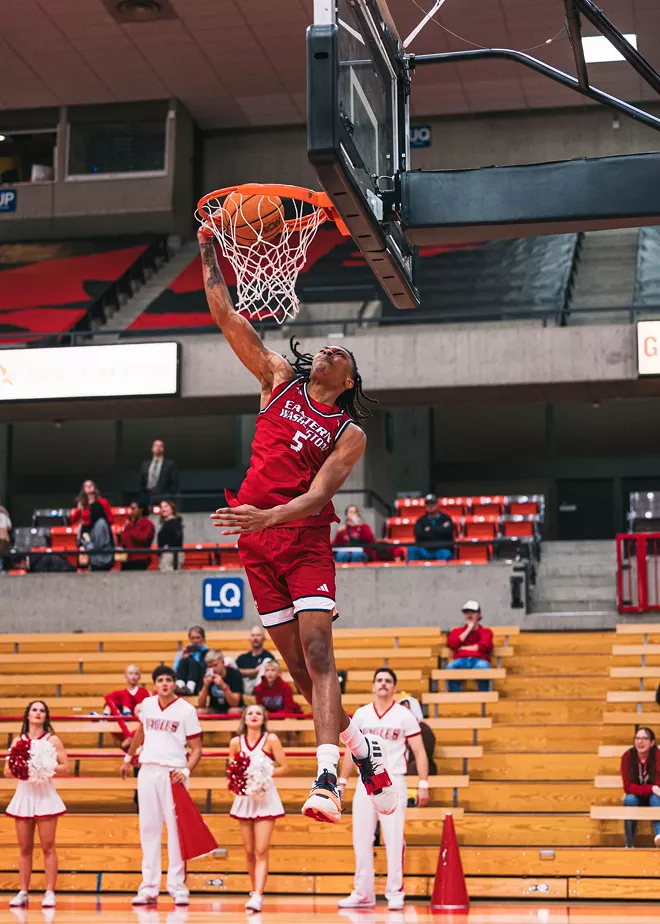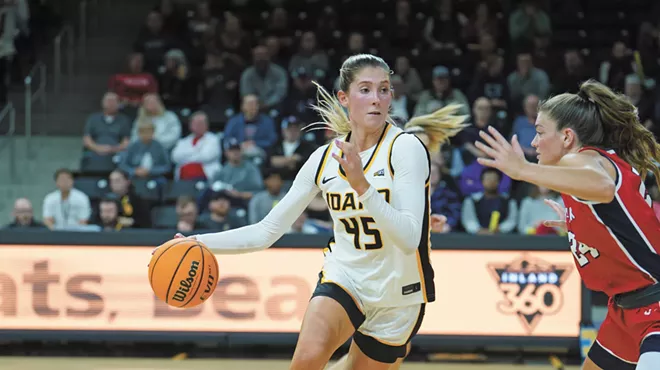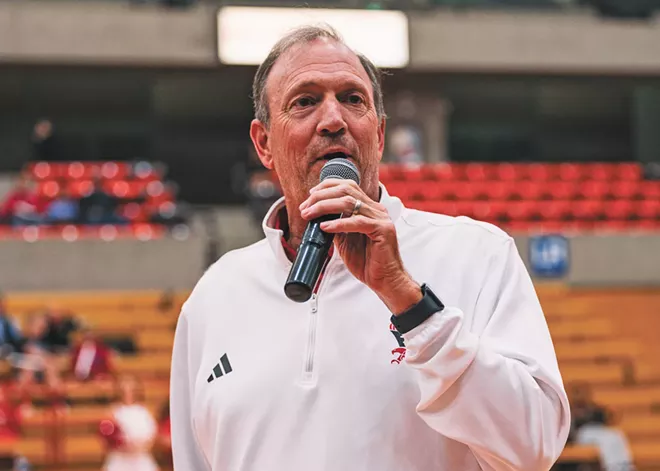Don't let anyone tell you that you can't go home again.
Dan Monson is back coaching college basketball in the Inland Northwest. Twenty-five years ago, as head coach of a little Jesuit school in Spokane that most of the country couldn't even properly pronounce, Monson presided over Gonzaga's improbable 1999 Elite Eight run in the NCAA Tournament. That squad served as the igniting spark that launched the Bulldogs to eventual hoops powerhouse status. And while the Bulldogs haven't missed a single NCAA Tournament since, Monson's career has taken a more winding path.
A Spokane native who grew up watching his dad Don (a Northwest coaching icon in his own right) on the sidelines, Monson left GU after that first improbable tournament success to coach at the University of Minnesota in the Big 10's power conference. While he rehabbed the Golden Gophers' culture after his predecessors' academic scandals and took his team to an NCAA Tournament, he didn't find the consistent winning ways the school wanted.
Next in 2007 he went to Long Beach State University for 17 seasons. Despite consistently posting winning conference records in the Big West, the school informed him this March before the Big West Tournament that he'd be fired once the season finished.
But then a funny thing happened. His team rallied around their soon-to-be-departed coach and just kept winning.
Monson once again became a beloved figure in college basketball as LBSU won the Big West Tournament, providing the coach with another magical tournament moment and a matchup against one of his former Gonzaga assistants, Arizona's Tommy Lloyd. While LBSU wasn't able to find any more Cinderella magic in the NCAAs, they'd given Monson a grand farewell from Long Beach.
Then an ideal new job opened up. When Eastern Washington head coach David Riley took his talents to Washington State (along with four of his starters), the Eagles swooped in and brought the 63-year-old Monson back to the Inland Northwest.
The Eagles aren't expected to be contenders for the Big Sky title this year (EWU was picked 9th in the preseason Big Sky Coaches Poll) after extreme roster turnover that's become the norm in the era of Name, Image, Likeness and open transfer portal rules. Only six players return for EWU (including zero starters) and the rest of the roster has been filled out with transfers hungry to get minutes (including players from LBSU, Arizona State, Nevada, another hooping Stockton son, Sam, and Monson's own son, Maddox). But despite the challenges the job presents, Monson seems incredibly at peace being back home where his friends and family can watch him continue to keep EWU's winning basketball culture going.
Before the new college hoops season tips off, we headed to Cheney to talk to Monson about the outlook for the Eagles, his friendship with Mark Few, and lessons learned from a long and winding coaching career.
INLANDER: When you were announced as the new coach at Eastern, I know a lot of folks around here felt like it was a perfect fit. What made EWU a good fit for you at his point in your coaching career?
MONSON: Well, it's kind of a throwback to me, personally, to be back. But it's also a throwback coaching wise. We're not a big NIL school, we're not a big portal school. We're just doing it the way that I'm comfortable doing it: developing players and giving kids an opportunity to come earn a degree and hopefully a skill set to go make money — but promising nothing on the front end. It's fun to be in that kind of environment.
So how did you go about building this year’s roster in that environment?
Well, I think the building of the program is new school, though. I think no matter what program you’re in, you’re going to have turnover. The opportunities that the rules provide for players now — both players that are doing well and players that aren’t doing well — you know that the retention is not going to be 100%. So you have to adapt to the rules. I’ve got to understand that assembling a team in a short period of time is going to be the norm. It’s been that way for about five years, and we were able to have pretty good success those five years at Long Beach. And I’m using that same formula to hopefully get these guys ready in a short period of time.
Does that constant state of roster flux in the modern game make the offseason competition for playing time more intense?
What hurt this year was one starter graduated and four starters went to Washington State. But what helped the program is that we have five starting positions open. And guys saw an opportunity here. Besides NIL, the second most important thing kids are looking for these days is opportunity.
So we signed five or six guys in the first two weeks I was here, because that was our recruiting pitch: ‘Hey, there’s an opportunity here.’ We got five open spots and a lot of playing time. I’ve never promised a player ever that he’s going to start or how many minutes he’s going to play, but I do point out that, you know, somebody’s going to come in here and be able to have that.
You were even able to land that Maddox kid.
He was my first. About 15 seconds after the text in the family group chat that said I accepted the job, he just sent back one word: “Committed.” It’s great when your own son believes in you, so that’s a start anyway. It would’ve been really scary if he said: “Portal.”
[Laughs] Yeah, that would’ve made for a weird Thanksgiving dinner.
Eastern Washington now has a pretty established tradition of being able to win in the Big Sky and compete for the conference's NCAA Tournament bid. What do you think about this place makes that kind of program success possible?
I think that's the biggest key. When you said, "Why did you take this job?" That was one of the huge [factors].
I'm here, my wife is here, all four of the grandparents are in their late 80s/early 90s, and we're able to all live together here. And to be able to be here for their last years was huge, personally.
But professionally, I looked at this job 25 years ago when I was an assistant at Gonzaga, and it didn't have any tradition or really any culture. You have to give a lot of credit to [Jim] Hayford and [Shantay] Legans and Riley.
I didn't have any starters left, but I had a great winning culture. The six kids that stayed here that had the work ethic and mindset that winning is what we do here. I got here in April, and guys were in here 7 in the morning every day getting shots up and they're here until noon. Four or five hours worth of work every day is gonna make you better.
What do you think is the strength of this Eagles team heading into the season?
The biggest key is going to be how versatile we can be. Our best players are all wings and guards. We have some inside players, but the strength of our team is on the perimeter. And so how many of those can we get on the floor at once? How many can be versatile enough to play inside? That kind of thing is going to be key to us being able to get our best five guys out on the floor consistently.
From the 1999 Elite Eight team at Gonzaga to last year's tournament run with Long Beach, you've coached some really special squads that have defied expectations. How do essences like those infuse themselves each season that you coach?
Well, I think that's what drives you. I've never used drugs, but I would think the NCAA Tournament is probably a natural high euphoria that comes close to that.
That's one of the big things, again, that drove me to this program. They've never won a game in the tournament. They've gotten there, but to be able to win a game in the tournament here would be a great thing in my legacy — to have taken four teams to the NCAA Tournament. There's only a handful of people in the world that have ever done that with four teams, and I would like to join that group. I started by taking Gonzaga to their first win in the tournament — their first three wins. I would like to try to end my career in the same area with the same results.
Do you talk about the arc of your career with your assistant coaches? Because you had so much success those two years at Gonzaga you might've felt like, 'Oh, I'll just be winning all the time.' And you've built winning cultures at multiple schools, but it hasn't always been that seemingly easy.
People kind of scratch their heads when I say this, but the run in 1999 was probably my biggest regret of my career and it's also the biggest highlight.
But it's the biggest regret because I didn't realize how special it was. I didn't really soak it up like I did last year when I went to the NCAA Tournament. I soaked up every moment of that knowing it was my last year at Long Beach. Whereas in '99, I just thought that was the norm.
And guess what? It has been for them, but it hasn't been for me. [laughs]
Yeah, I imagine it's probably a little weird with a lot of people kind of treating you like (original drummer) Pete Best with The Beatles. Like you were there, but things went to a whole nother level as soon as you left. But you don't strike me as someone who has regrets about that.
Nobody can ever take away that I was there at the beginning of it. I've certainly been a Zag fan. I watch every game. I talk to Mark [Few] after almost every game.
It's great. We live [near each other] now. We're back. We don't live together like we did for 12 years, but we're probably closer than our wives want us to be right now. [Laughs]
People are like, "Don't you regret going to Minnesota?" I'm like, "No. I don't." At the time it was the best decision for me and my family, and I really think for my marriage and for my kids, it was the best move. It made me and Darcy go to a place where — you know, all my friends were here, all her friends were here — it made us go back and have to rely on each other. It strengthened our marriage. We had four kids in Minnesota. I think we would have been totally different.
I think it made me a better coach — because I had a lot more adversity — and just a better person. It was a humbling experience.
Do you ever bug Mark about trying to schedule a Gonzaga versus EWU game?
Not like my [athletic director] does. Playing friends is tough, it’s tough. I love playing Tommy [Lloyd] in the tournament, because if I couldn’t go, I was so excited [for him]. He had all this pressure on him to advance.
But I really don’t have an interest of playing Gonzaga. I wouldn’t mind beating them, but that’s really not realistic right now. So until it got realistic, and we got more competitive and closer to their level? Just to go take a beatdown? I’d rather go to Missouri, like we’re going to this year. Get away a little bit and bond with my players.
Outside of hoops, as a former football player at IU, are you getting some joy out of the Idaho football revival under Coach Eck?
I am. Don’t tell Coach Best that — I’m rooting like crazy for the Eagles [when they play] — but yeah. I went to college there, so I have Vandal in my blood. I have Bulldog in my blood. But I’ve got Eastern in my heart right now. That’s a big difference.
So what are your goals heading into this season?
My goal is always to win. I think we've got a long ways to go to be realistically able to win the Big Sky Championship, but we're gonna try to take that long road, and we're gonna try to get there. I'm lucky. Like my wife said, "Who else picks up a career at 62 years old and moves across the country to go start all over again?" I guess I do. And I'm pretty thrilled to be able to get to do that.
It's a tough profession, and I've been so blessed to be in three places in 40 years. I mean, who gets to say that? I was 12 years at Gonzaga and eight years at Minnesota and 17 there. So that's 37 years in three places. And then basically, back to where I started. And that's the circle of life. ♦



